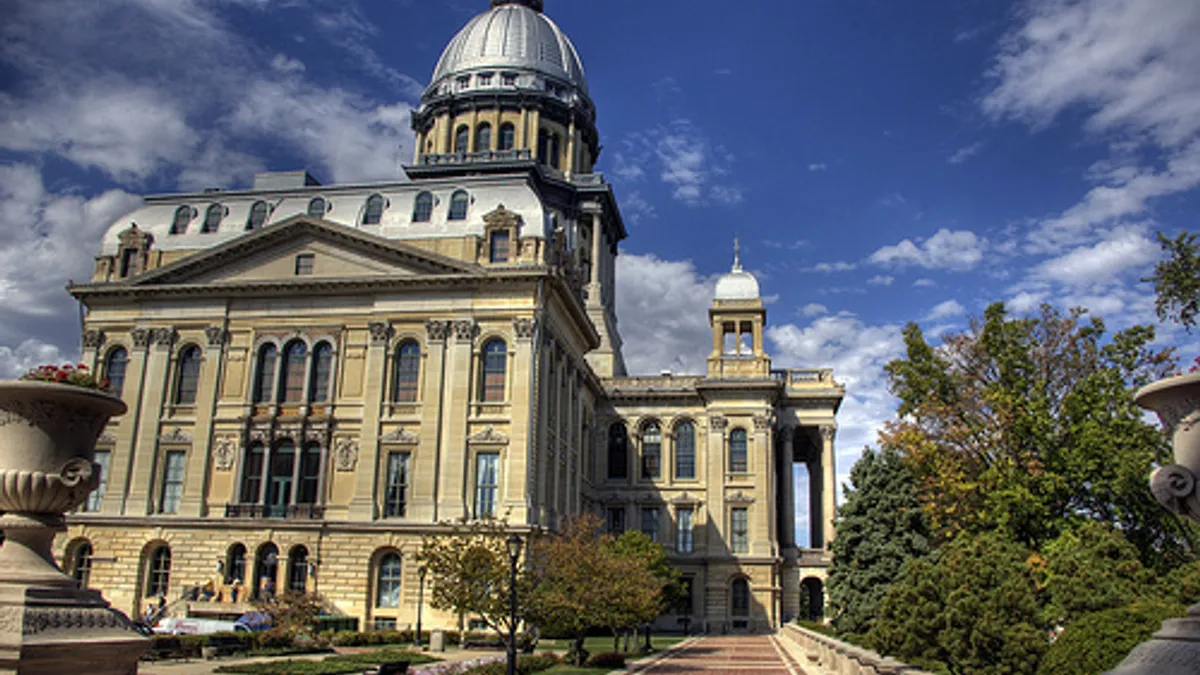Dive Brief:
-
Exelon is again preparing to introduce a bill in the Illinois legislature aimed at saving two of its at-risk nuclear plants the utility says are unprofitable in regional electricity markets and will close without financial support, Crain’s Chicago Business reports.
-
The bill would calculate subsidies for the nuclear plants and incorporate a social cost of carbon dioxide emissions as the baseline for rewarding the nukes for their lack of emissions with adjustments based on market conditions, according to a draft version of the bill obtained by the media outlet.
-
The subsidy structure recalls the design of New York's nuclear subsidy program, designed to avoid federal jurisdiction over power markets. The bill also includes provisions for state negotiated power purchase agreements for as much as 4,000 MW of new wind and solar power projects over the next 14 years, as well as measures that would allow Commonwealth Edison to earn a profit on energy reduction programs.
Dive Insight:
Exelon is petitioning the Illinois legislature once again, according to a media report last week, this time with renewed urgency.
Last spring, Exelon, the corporate parent of Chicago utility Commonwealth Edison, tried to move legislation in the state that would have addressed a variety of issues – from utility microgrids and revising the state’s renewable portfolio standard to aiding the company’s ailing nuclear plants – but the legislative session ended without lawmakers ever taking up the bill.
Since then, the prospects of Exelon’s Quad Cities and Clinton nuclear plants have faded further. In May, Exelon said that Quad Cities – along with its Three Ile Island nuke in Pennsylvania — did not clear the PJM Interconnection’s annual capacity auction, which will result in lower income for the plants three years from now.
The Clinton plant cleared a preliminary MISO reliability auction, but the resulting price was not enough to cover operating costs and returns to shareholders, according to the utility. Exelon says it wil shut Clinton and Quad Cities in June of 2017 and 2018, respectively, if support legislation fails.
“We remain hopeful that we can reach a constructive solution that truly is in the best interests of our state and our fellow Illinois citizens,” Crane said on Exelon's quarterly earnings call last week. “But absent action during the upcoming veto session, both facilities will close.”
According to Crain's, a draft version of Exelon's revised bill incorporates a social cost of carbon measurement to help determine the subsidy levels for the two plants, with adjustments for market conditions. That would recall a support plan approved in August by New York regulators to save three upstate nuclear plants, which was designed to avoid FERC's jurisdiction over regional power markets by pegging subsidies to nuclear's carbon-free attributes.
Exelon is a chief supporter of that subsidy plan and announced it would buy the Fitzpatrick plant in the state from Entergy if the supports are implemented. But the sale and the plan itself face court challenges from consumer groups and generators who say the subsidy unlawfully alters organized market construction and infringes on federal jurisdiction.
In Illinois, Exelon’s goal is to pass the bill in the upcoming fall veto session next month. Crain's notes that provisions to have Illinois take over capacity purchases from MISO in lower Illinois were not included. That would boost payments to coal plants in the state and could help win support for the bill there, but the company instead is touting the environmental benefits of the measure.
The capacity purchase proposal and nuclear supports are part of a broader campaign from leaders of major investor-owned utilities to revise the structure of organized power markets to deliver higher payments to baseload nuclear and coal plants. Should subsidy actions like the Illinois plan fail, some industry observers expect plant owners to push re-regulation of state power markets to save their fleets.













